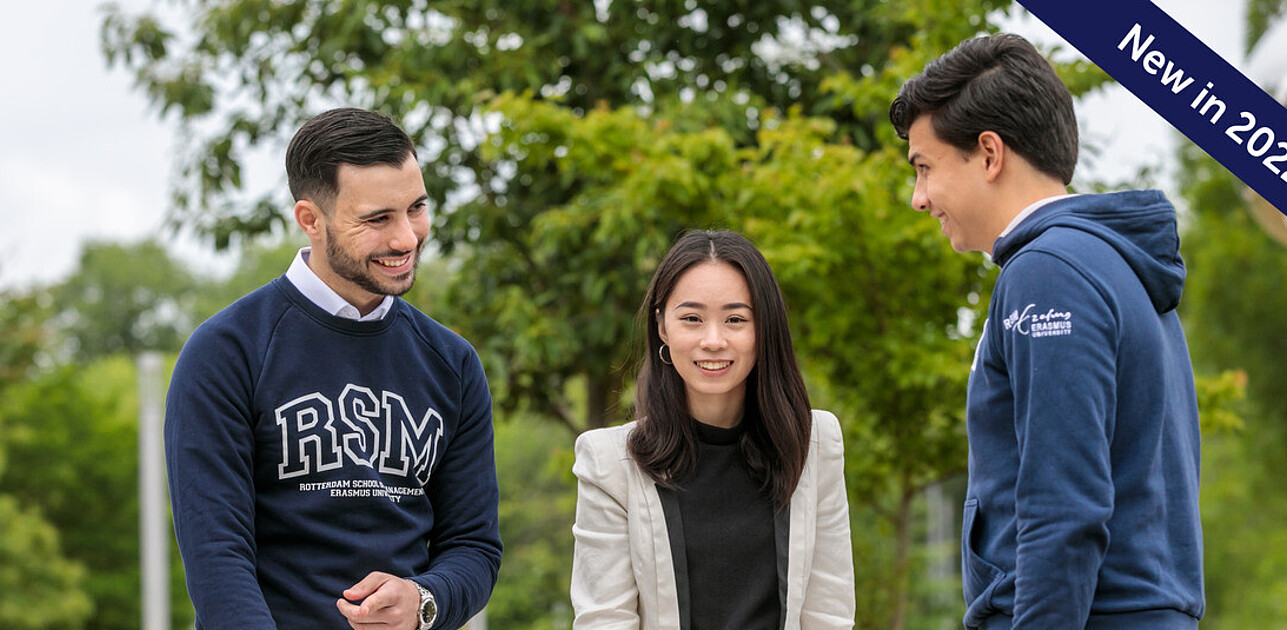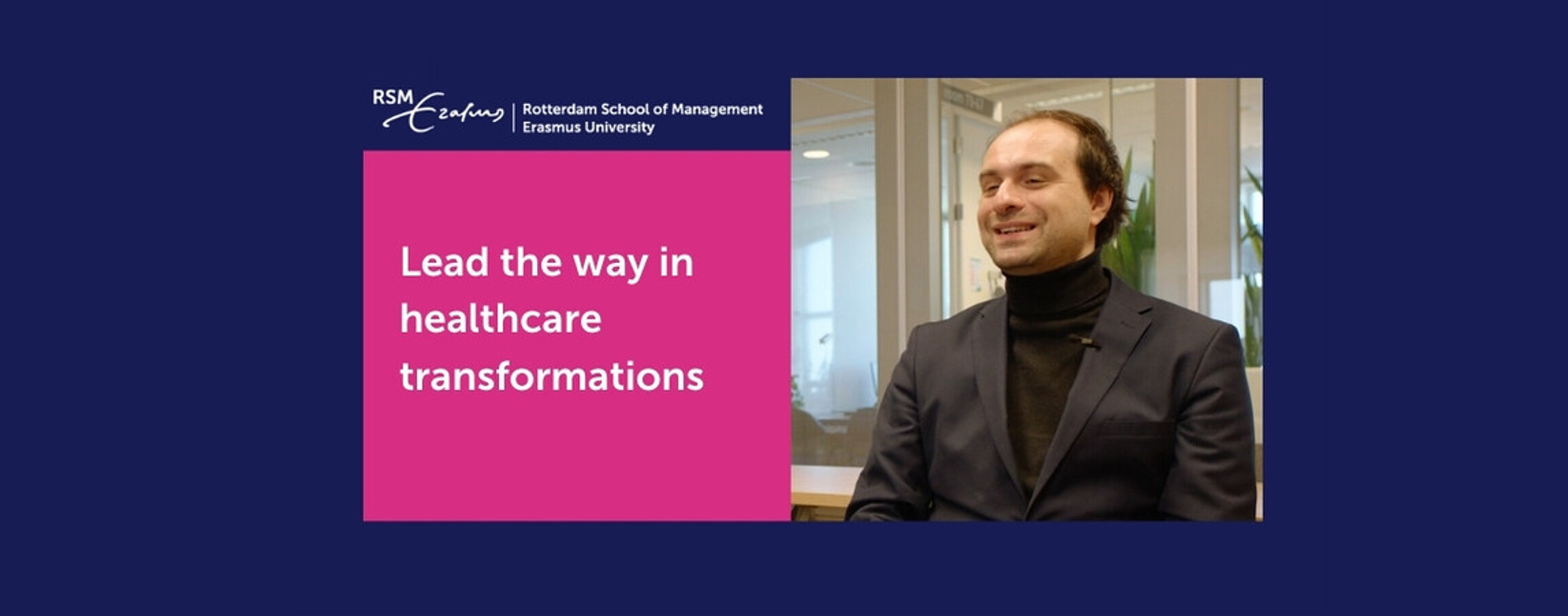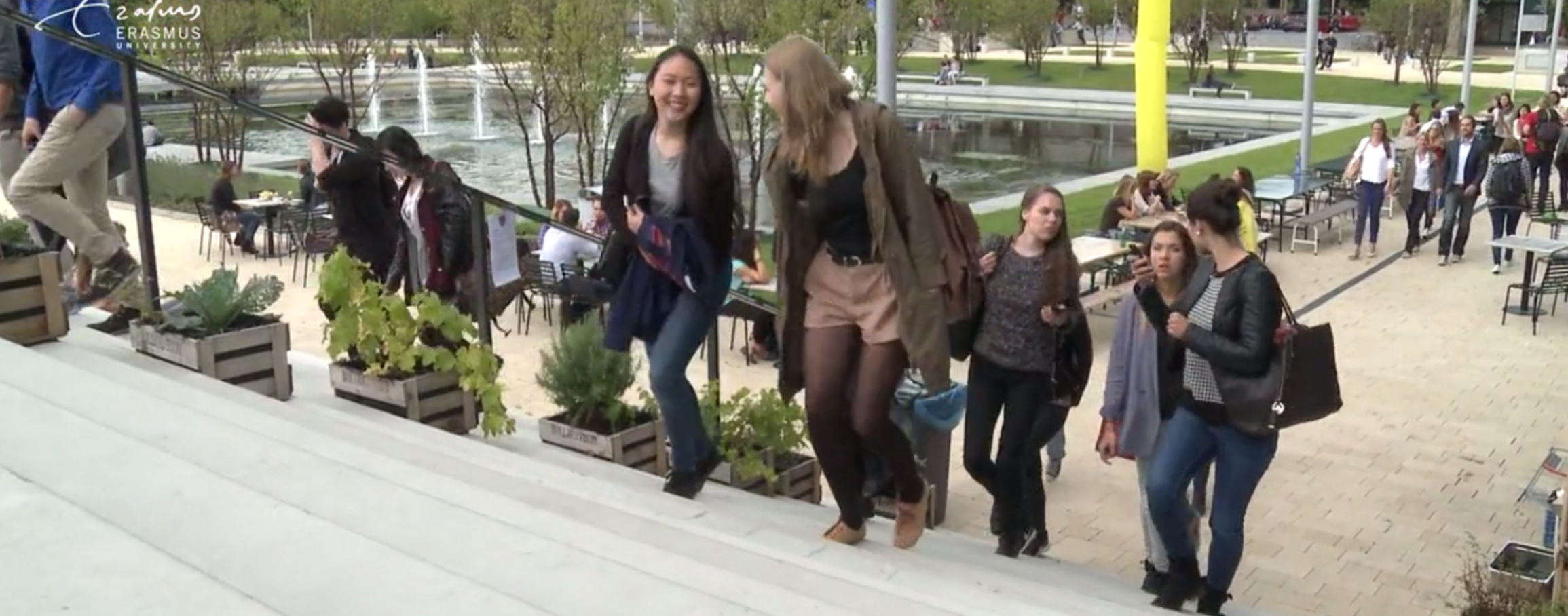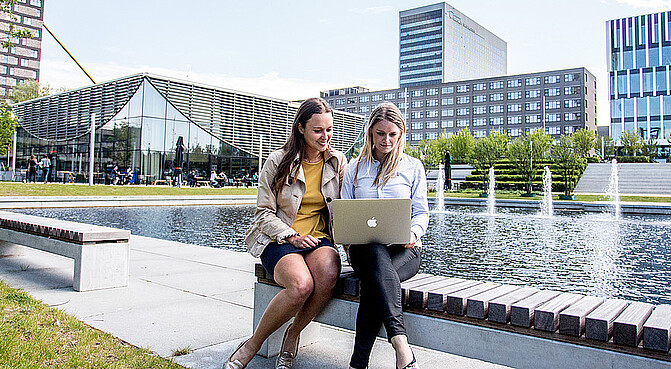Curriculum
Do you want to know more about the MSc MI Medical Business & Innovation programme?
The video below will answer the most frequently asked questions about the programme.
Overview
This programme includes two semesters and five study blocks. In the first semester, the focus of learning is the process of innovation in general and you will share your core courses with fellow students from the MSc MI Management of Innovation.
In the second semester, the focus switches to the process of innovation in healthcare settings. There are two MBI core courses in study block 3: Medical Innovation, and Intellectual Property.
In the last two study blocks you can choose elective courses such as Digital Transformation in Healthcare, or Healthcare Procurement and Value Chain Management.
RSM is well known for its international outlook and innovative research, with dedicated faculty in seven research departments and numerous interdisciplinary centers working together to explore common research themes.
Academic calendar
Please note that core courses and electives are subject to change each academic year. While some electives are very popular and we can place most students in the elective(s) of their choice, there are no guaranteed places.
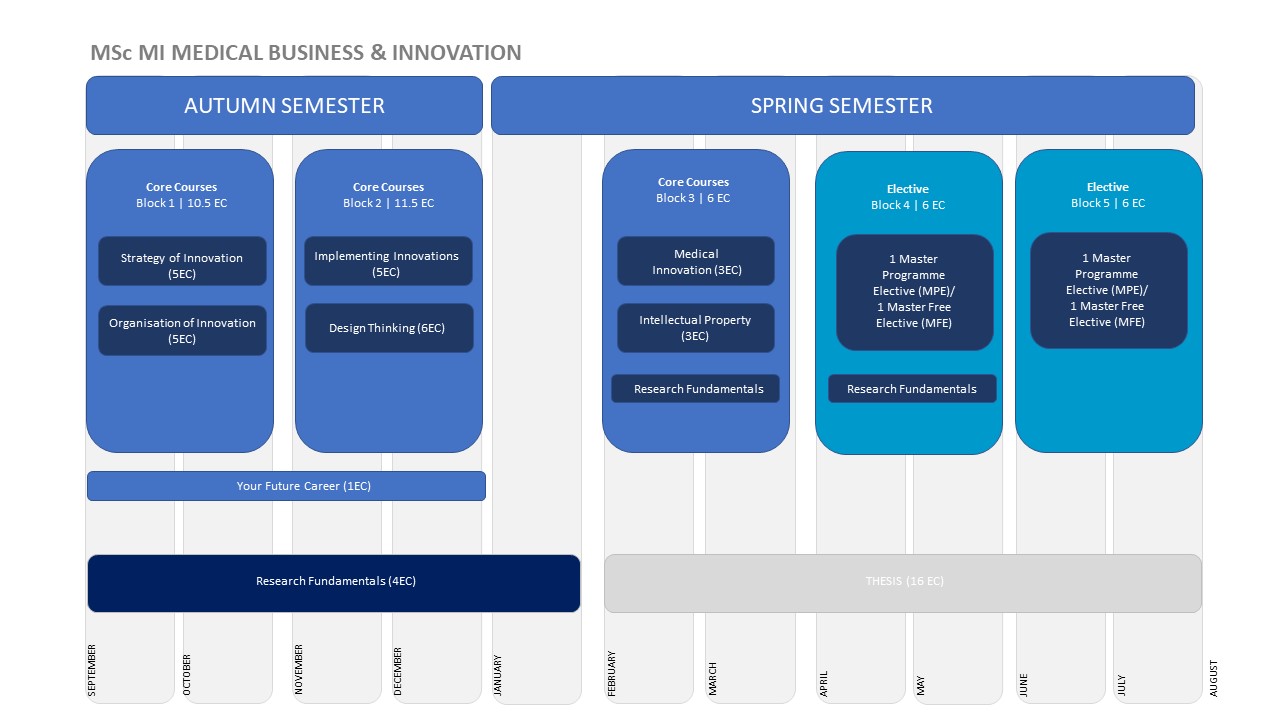
Autumn semester - core courses
This is where you start to build your knowledge of innovation management.
The first two core courses, Strategy of Innovation and Organisation of Innovation, focus on understanding why organisations innovate and how they organise themselves to create, deliver and capture value.
During the next two core courses, Design Thinking and Implementing Innovations, you will develop creative ideas and run projects to make them materialise.
The last two core courses, Medical Innovation and Intellectual Property, teach you the principles of innovation in healthcare, and show you the route of patent applications.
Spring semester - electives
What you learn during your chosen electives complements the new knowledge you have gained from your core courses in the previous semester. You can choose from electives* including: Digital Transformation in Healthcare, Healthcare Procurement and Value Chain Management, Circular Economy, or the Entrepreneurial Lab.
For a detailed description of all of the courses including electives, please view the course catalogue (for reference only, catalogue continually updated throughout the year).
*Please note that certain electives may be very popular. Although we can place most students in the elective or electives of their choice, we cannot guarantee a place.
Research Project
Research is one of the most important components of our programme. It informs your studies because you learn about the latest research developments in innovation management in healthcare. And you will conduct your own research and make your own personal contribution to the field.
You will work alone for most of your research but you will be in close contact with faculty members who will coach you as you develop your research project.
You will also get support from your instructors, who will guide you as you work out how to operate your research project. And you get reflection and feedback sessions with your fellow students – these will help you to share the kinds of experiences and best practices that help everyone to make progress.
All of this work – to develop and operate your research project – is part of the Research Trajectory.
Here’s what you need to know about the Research Trajectory:
- Runs through the academic year, from October to June.
- You can choose a multidisciplinary research topic from our list of options, or you can follow your own research interest from a complementary discipline.
- You will have a coach from RSM, and a co-reader from Erasmus MC.
- Your coaches are expert researchers who have published in top academic journals.
- You will deepen your knowledge of research methodologies with lectures for interactive feedback, gamification, and in-class discussions.
- Your contribution to science and to the practice of innovation management will be available to the public and the healthcare community.
Learn more
Honours class
An extracurricular course for about 25 selected students to work on a high-stakes strategy consulting assignment for a real client. Students in this project receive intensive coaching from partners and consultants from a top strategy consulting firm.
Internship
You can get a taste of working life – from large multinationals to fast-growing start-ups – by applying your new wealth of knowledge to a real company problem during your internship, which is optional in your programme. The RSM Career Centre will support you in finding a suitable position. Many students acquire their first job after graduation from the contacts they make during their internship.
International exchange
Explore the world and broaden your study experiences by going on international study trips and exchanges at other top schools. RSM has an extensive partner school network of more than 100 business schools and universities worldwide, including top business schools such as ESADE in Barcelona and The Wharton School in the USA. An international exchange is an optional element after you’ve studied for your master for at least one year.
Career opportunities
This one-year programme is an important stepping stone for a career path in the growing sector of medical business and innovation. When you graduate from this master’s programme, your career options could include product manager in a life science or medical technology company, medical entrepreneur, R&D manager in the healthcare industry, technology transfer manager, or medical industry consultant.
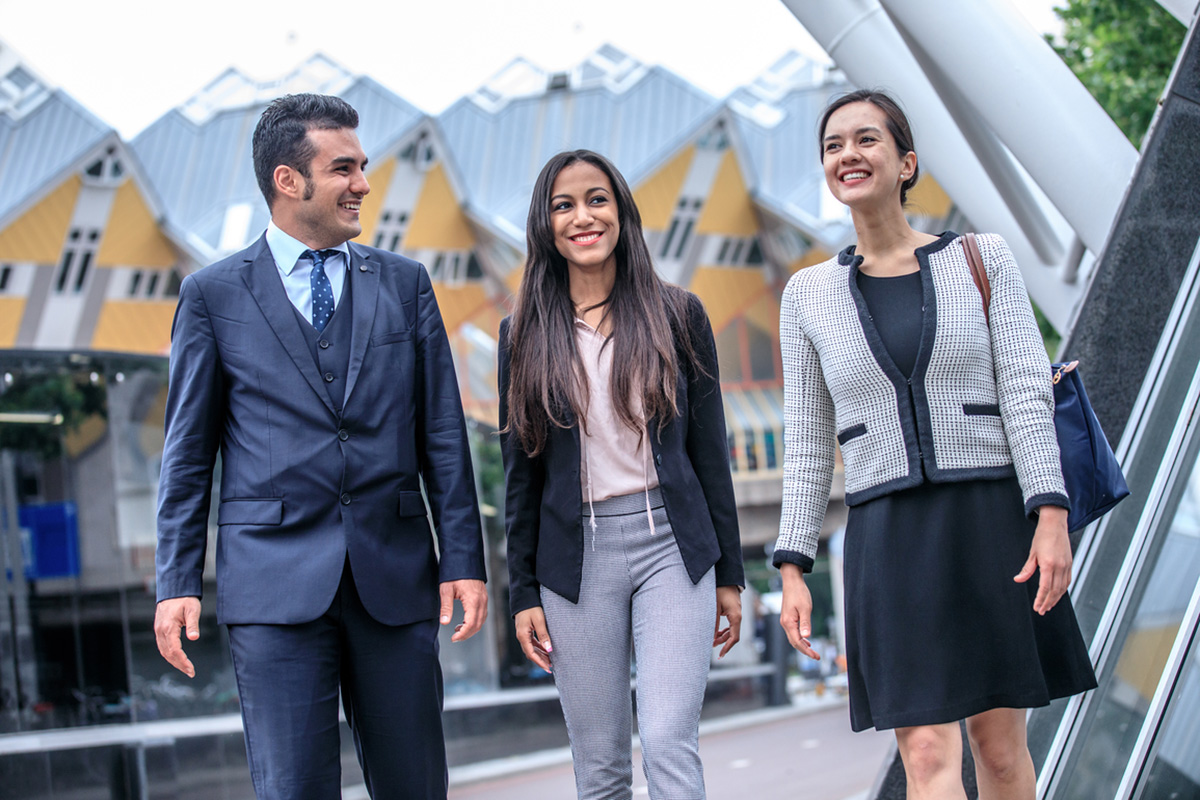
Good to know
Orientation year for Non-EEA graduates
Non-EEA nationals who have earned a diploma from a higher education institute in the Netherlands can apply for a special residence permit called the orientation year after completing their studies. The 'Orientation Year for Graduates Seeking Employment' is a residence permit aimed at retaining foreign talent for the Dutch labour market. During this orientation year you are free to work without a work permit. Participants who find a job during this period can change their orientation year into a residence permit for Highly Skilled Migrants under more favourable terms.
For the most up-to-date information please visit the following website.
Career centre
What's next after your studies? The RSM Career Centre is your guide for an impactful career. Its expertise in the labour market, personal branding and connections with employers will prepare you for your business career. Get ready for some exciting job fairs, workshops, speed interviews and coaching. You may land your first internship or job before you even graduate!
Alumni network
You’re a member of the RSM community from Day 1. After you graduate, you’ll also be a member of the RSM alumni network. The countless benefits include networking events worldwide with local chapters, lifelong learning and professional development, mentoring opportunities and access to the latest business knowledge and research. Your study at RSM is the first step towards being part of this inspiring community that you’ll be part of forever.
Studying at RSM
Talk to our current students!
Chat with our student ambassadors and ask any questions you have.
Fees & scholarships
The 2024-2025 tuition fee for the MSc programmes is approximately €22,500 for non-EEA students. The Dutch government contributes towards this cost for students who hold a nationality from a country belonging to the European Economic Area(EEA). These students therefore only pay the statutory fee €2,530 in 2024-2025.
For EEA nationals who have already completed a master in the Netherlands (and obtained the diploma) the tuition fee for a 2nd master is approximately €13,200.
Please note that all these tuition fee tariffs are subject to change.
There are other costs associated with the Master programmes, for more information please review the “Other expenses” section below thoroughly.
Scholarships
The number of scholarships is limited and mainly merit based. If a scholarship covers only the tuition fees, be aware that you need to finance your own living expenses (rent, food and insurances) for the duration of your studies. RSM does not offer scholarships for the pre-master programme. We do however offer a maximum of 2 scholarships per academic year to RSM pre-master students enrolling in an MSc programme.
Scholarships offered by RSM
Rotterdam School of Management, Erasmus University (RSM) offers multiple scholarships to prospective students from non-EEA countries who are not entitled to pay the EEA tuition fee, provided their grades are considered ‘excellent’. RSM also offers one scholarship, the Erasmus Trustfonds Scholarship, to students from EEA countries.
Other scholarships
Besides scholarships awarded by RSM, there are also scholarships awarded by the Dutch government or other organisations that are available if you meet certain criteria such as nationality, age, etc We have listed some of them below but we encourage you to use resources such as Grantfinder or the Scholarship Portal to find additional scholarships.
- StuNed
- G&D Europe Scholarship
- NN Future Matters Scholarship
- Russia: The Global Education Programme
- LPDP
- OKP
Scholarship tips
- Contact the Ministry for Higher Education in your home country to see whether there are scholarship options.
- We have virtual information session covering all you need to know about scholarships and financial aid. Watch it here.
Student loan options
For students from the Netherlands or the EU/EEA, it may be possible to apply for limited funding towards payment of your tuition fees. Find out whether you meet the nationality and age requirements and read more information about the application process here.
IM/CEMS is a program that - if you are still eligible - entitles you to a maximum of 1 year's use of your DUO entitlements. Students who have received a basic grant and possibly a supplementary grant from DUO in the first year of IM/CEMS and meet the following additional conditions may be eligible for an additional half year (6 months) of financial support, which is equal to the grant received in the last month during the program. Please contact the student counselors for more information.
Conditions Financial Support Fund
Students eligible for financial support due to extended master programmes are those who:
a) are enrolled full-time in a public funded Erasmus University Rotterdam degree programme, which is extended on the base of article 7.4, paragraph 8 of the Dutch Higher Education and Research Act;
b) are enrolled as first enrollment (hoofdinschrijving) in the study programme as referred to under a, for which the student pays statutory tuition fee;
c) for this program, is or was entitled to study finance (prestatiebeurs hoger onderwijs) as referred to in the Wet Studiefinanciering 2000, and during the period corresponding to the study load that exceeds 60 ECs, and is no longer eligible for student finance in the form of an additional grant.
Other expenses
Master Application Handling fee
After having filled in all of the necessary application information on the Online Application Form (OLAF) and uploaded the required documents, applicants with a degree obtained outside the Netherlands will be asked to pay a non-refundable €100 handling fee. This fee can be paid online via the Erasmus Payment System which uses either iDEAL (for those with a Dutch bank account) or PayPal (which can be linked to any bank account or credit card worldwide). It is important that applicants complete the payment process as indicated, otherwise the system cannot register the payment.
Additional programme related expenses
The additional expenses in addition to tuition and general living costs (see below) vary per programme and may include:
- Study materials such as books, readers and business cases
- Costs involved in kick-off meetings
- Costs related to travel, international excursions and compulsory exchange semesters or internships abroad
Approximately € 300 - 500 (per year), these costs differ per programme.
Living expenses
For a reasonable standard of living in the Netherlands, you should have an income of between €1,235-€1,735 per month depending on your lifestyle. Further information about the costs of living in the Netherlands and related subjects can be found on this website. Below is an example of monthly expenditures:
Example of monthly expenditures
| Furnished accommodation, including gas and electricity | € 500-1,000 |
| Medical insurance | € 50 |
| Telephone/internet | € 15-40 |
| Food | € 300 |
| Books, recreation, clothing | € 300 |
| Public Transportation | € 50 |
| Total | € average 1235 - 1735 |
| Other potential expenses: | |
| Buying or renting a bike | € 100 - 250 (per year) |
| In private residence (not student housing) yearly municipal and water taxes | € 100 - 300 (per year) |
| Study trip or other study related travel | € 300 - 500 (per year) |
Study and work - part-time jobs
Please ensure, prior to your arrival at RSM, that you have or will have sufficient funding available to finance your stay at RSM. Finding a part-time job, may be an option, but can not be guaranteed. You should therefore not rely on finding other ways to supplement your income during your studies. For additional information on obtaining a part-time job, visit the website of the Nuffic.
For EEA students there are no formal restrictions in finding work in the Netherlands, but students with a lack of Dutch language skills will find it difficult to secure employment. Non-EEA students are subject to labour regulations, which makes the likelihood of obtaining a work permit very small. We therefore ask students not to rely on this possibility. We do not encourage students to combine studies with the heavy workload from a part-time job.
Admission & application
Application for the September 2024 intake opened 1 October. There is currently no maximum capacity in place for this master. Deadline to apply is 15 May.
Immigration & housing
Immigration & visas
Find out everything you need to know about entry visas & residence permits for non-EU or EEA students at RSM.
Housing
Finding housing in Rotterdam can be tricky. To help you in your search for housing, we have compiled some helpful resources
